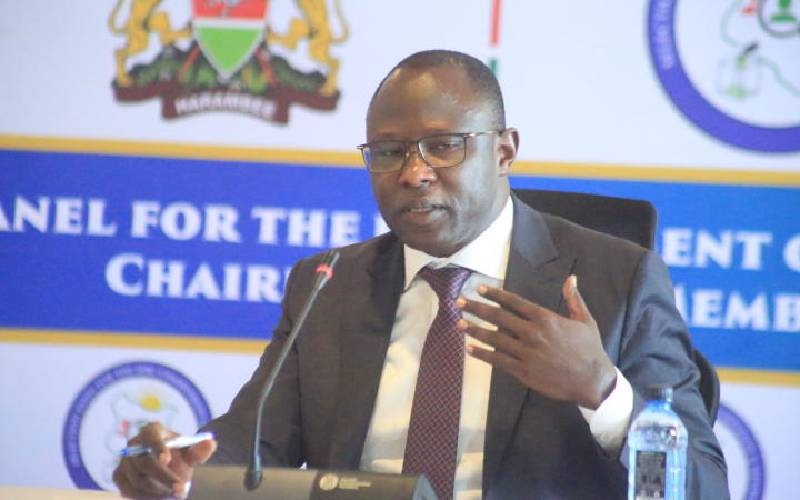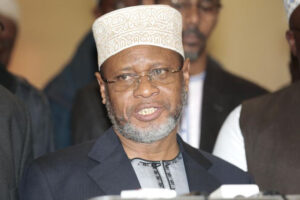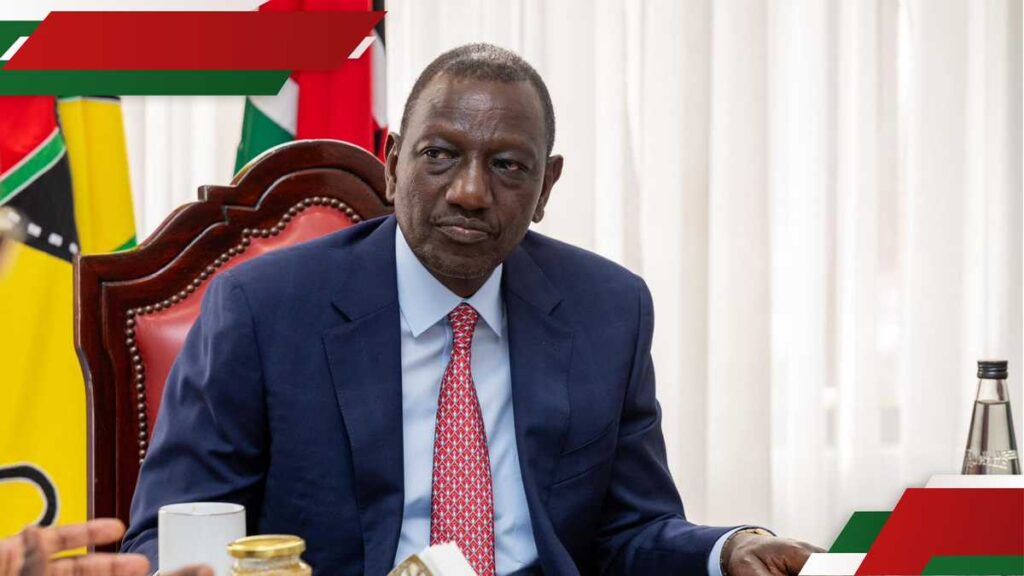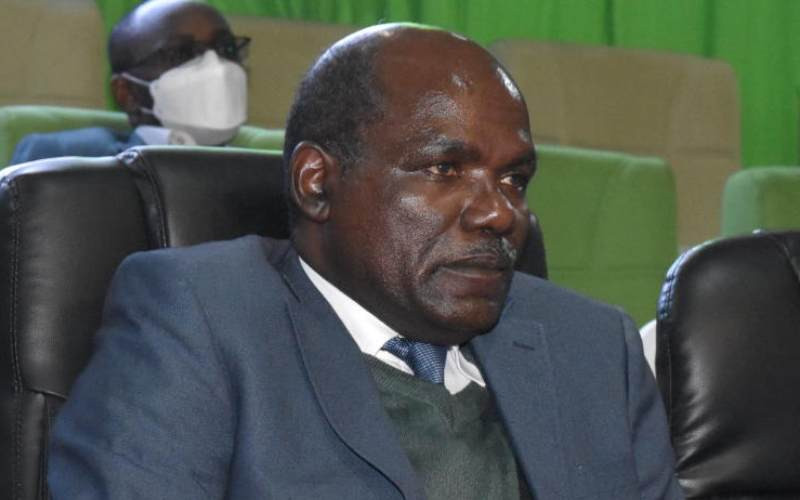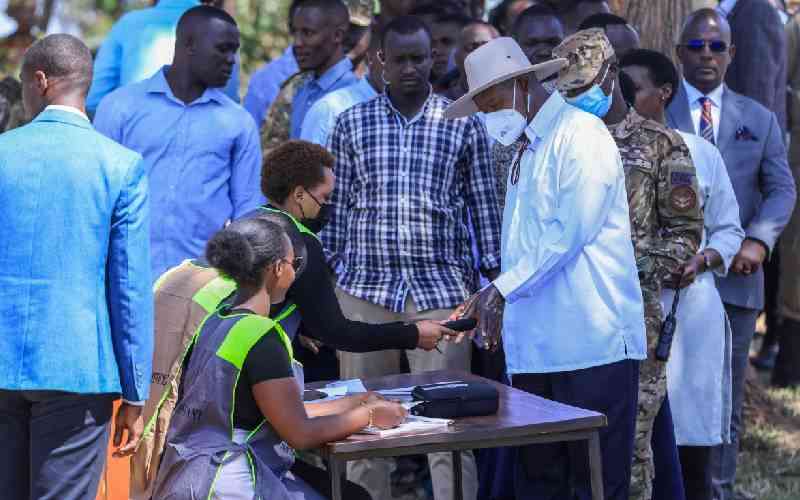After weeks of tension and uncertainty, the country’s road to the 2027 General Election has finally been cleared.
This follows the High Court’s decision on Thursday, upholding the nomination of the seven nominees to the Independent Electoral and Boundaries Commission (IEBC), ending a major obstacle in the commission’s reconstitution and setting the stage for a new electoral body as the country prepares for elections.
In a detailed judgment delivered by a three-judge bench comprising Justices Roselyne Aburili, John Chigiti, and Bahati Mwamuye, the court dismissed a petition challenging the selection of the commissioners, including chairperson-designate Erastus Edung Ethekon, finding no evidence of illegality or constitutional breach.
However, the judges nullified President Ruto’s appointment of the IEBC chair and six commissioners for disobeying court orders.
The bench quashed the appointments of the seven to the IEBC on the grounds that they were illegal and unconstitutional, having been made in violation of an existing court order.
The court found that the gazette notices by the Executive violated existing conservatory court orders, rendering the appointments null and void.
Citing breaches of constitutional Articles 1, 2, 3, and 29, the court emphasised the importance of upholding the rule of law and protecting democratic governance.
President William Ruto now has the opportunity to regularise the appointments of the seven IEBC nominees, paving the way for their swearing-in.
The bench, which addressed ten issues raised in the lawsuit, found the recruitment process constitutionally sound and ruled that the procedural concerns raised by petitioners Boniface Mwangi and Kelvin Omondi did not amount to violations of law.
“The process was consistent with both the letter and spirit of the Constitution,” the judges said, emphasising the importance of institutional stability.
The court affirmed the constitutionality of the appointment of Erastus Edung Ethekon as Chairperson of the Independent Electoral and Boundaries Commission (IEBC).
The petition challenging his nomination on grounds of perceived bias and procedural irregularities was dismissed as lacking merit.
In a comprehensive and strongly worded judgment delivered by Justice Roselyne Aburili, the court held that the selection process adhered to constitutional principles and dismissed claims of partiality as unfounded.
“This court finds that the selection and nomination of IEBC Chairperson Erastus Edung Ethekon for appointment to the IEBC has not been shown to contravene the Constitution. The claim on the ground of conceived bias is without merit and is hereby dismissed,” Justice Aburili ruled.
Stay informed. Subscribe to our newsletter
The petitioners had alleged that Ethekon’s prior roles created a reasonable apprehension of bias and that his ties to certain political actors violated the principle of impartiality.
They pointed to his past professional associations and alleged links to political violence and patronage. However, the Court ruled that no credible or objective evidence had been adduced to prove such claims.
“In public and electoral administration, perception matters greatly. It is more important for the process to be fair and to be seen to be fair. However, this principle must be balanced against the constitutional right of individuals to public service,” Justice Aburili said.
The court found that Ethekon’s previous role as county attorney was lawful and professionally conducted, with no evidence of political favouritism or undue influence.
The court dismissed the petition seeking to block Hassan Noor Hassan’s nomination on the basis of his familial ties to politician Junet Mohamed, finding no evidence of undue influence, conflict of interest, or judicial bias.
The court delivered a firm rebuke to efforts seeking to disqualify judicial nominees based on family connections. Justice Bahati Mwamuye, reading the decision on behalf of the bench, affirmed the court’s stance on judicial independence and the professional rights of judges’ relatives.
“We fully endorse the findings of the High Court that family members of judges are entitled to pursue independent careers, and such pursuits, in and of themselves, should not raise a doubt on a judge’s impartiality,” she declared.
The bench emphasised that familial relationships should not create an automatic presumption of conflict.
“Family members of judges, like any other qualified venue, can locally be appointed to any public office, and that, per se, cannot be a ground for a judge’s refusal, unless it is demonstrated that the appointment is intended to give the appointing authority an undue advantage in judicial proceedings, or for any other improper factor relating to the appointment and the judge’s discharge of judicial duties.”
“To suggest otherwise,” Justice Bahati added, “would impose an unreasonable and disproportionate burden on judges and judicial officers.”
Addressing specific concerns regarding Hassan Noor Hassan’s nomination, the court found no basis to conclude that his familial ties, particularly being the brother-in-law of politician Junet Mohamed, rendered him ineligible.
“The professional undertaking of a judge’s spouse, particularly where they bear no direct relevance to matters before the court, does not serve as a valid basis to question the judge’s objectives,” the judgment read.
“In the absence of specific and compelling evidence of a conflict of interest, such allegations amount to mere speculation and fail to meet the requisite legal standard for judgment.”
The court referred to the 2015 decision in Heaven and Juana v. Pierpont, Juana and Harold, noting that precedent clearly establishes the threshold required for a successful challenge to a public nomination. In this case, that threshold had not been met.
“We find that the petitioners have not discharged the legal burden of proving that any need in relation to the court’s petition influenced the nomination of the Fifth Judicial Party, nor that he will not be impartial in the discharge of his mandate as a member of IEBC.”
The court also dismissed suggestions that Hassan’s relationship with political figures was sufficient to undermine his candidacy.
“In the absence of any influence, interference or irregularity in the proof, the Fifth Judicial Party’s chameleon relationship with political actors and public officials has not moved to validate the case of election nomination and possible appointment to serve as a member of the Iebc, which the state offers, provided that the selection, nomination and possible appointment satisfy all other constitutional and statutory requirements.”
Addressing a broader element of the case, Justice Bahati stated: “We therefore reject the invitation by the petitioners to declare Hassan ineligible for nomination and appointment as an IEBC Commissioner on account of familiar conditions in the study of the petition.”
She further clarified: “Hassan’s relation with politician Junet Mohamed cannot invalidate his selection or appointment to serve as a commissioner of the IEBC or any state office, provided that the constitutional and statutory requirements are met.”
The bench also rejected the wider petition seeking to disqualify all seven nominees to the IEBC listed as interested parties on grounds related to their familial connections or current service in government.
“We therefore reject the petitioners’ invitation to declare the seven nominees, who are listed as interested parties, ineligible for appointment as IEBC commissioners on account of family relations or serving as state officers,” the court said.
Significantly, the court noted that Hassan did not deny being Junet Mohamed’s brother-in-law.
However, the central question was whether that fact alone was the basis of his nomination.
Justice Bahati concluded: “The question is whether that was the sole reason for his proposed nomination. The petitioners have not said whether this relationship was the only ground, nor have they provided evidence that his appointment was improperly influenced by that relationship.”
The court declined to invalidate the nomination of Ann Nderitu to the Independent Electoral and Boundaries Commission (IEBC), ruling that her position as a state officer at the time of application did not automatically disqualify her from consideration.
Delivering the judgment, Justice Roselyne Aburili ruled that the court found no constitutional violation in Nderitu’s nomination, noting that she had complied with the requirement to resign from her current position before assuming the new office.
Nderitu, who currently serves as the Registrar of Political Parties, had faced a legal challenge questioning her eligibility to serve as an IEBC commissioner on the grounds that she was a state officer during the application process.
However, Justice Aburili dismissed this argument, stating: “We consequently find and hold that the mere fact that Ms. Nderitu was a state officer at the time of application for the position of Commissioner at the electoral body did not, in itself, render her constitutionally ineligible for consideration for appointment to the IEBC — provided she relinquishes her prior office before taking the oath or assuming the new office, if successfully appointed.”
The court emphasised that constitutional eligibility hinges on whether a nominee resigns from their current position prior to taking up a new public office, not necessarily at the point of application.
Justice Aburili further affirmed that there was no evidence suggesting Nderitu had failed to resign or that her nomination process violated any legal provisions. Accordingly, the court upheld the nomination process and declined to interfere with her potential appointment to the IEBC.
Justice Aburili also delivered a decisive ruling on the petition challenging the eligibility of Independent Electoral and Boundaries Commission (IEBC) nominees, Mukhwana, Karen, Odhiambo, and Abdallah.
The petitioners argued these individuals were disqualified from holding elective public office under Article 88 of the Constitution.
Justice J Chigiti, reading for the three-judge bench, addressed a key preliminary issue on whether the petition was competently filed under Articles 22 and 23 of the Constitution of Kenya.
The petitioners were challenging the legitimacy of the nomination process and are asking the court to nullify the entire exercise and order that it be restarted afresh.
In their petition, Omondi and Mwangi claim the process leading to the nomination of the commissioners was flawed, unconstitutional, and marred by procedural irregularities.
They argue that the selection lacked transparency, failed to uphold merit, and did not meet constitutional requirements for regional and ethnic diversity, gender representation, or inclusion of persons with disabilities. According to them, the appointments violated key constitutional provisions, including Articles 10, 88(2), 232, and 250 of the Constitution.
The petition seeks to bar the seven nominees, Ethekon, Anne Njeri Nderitu, Moses Alutalala Mukhwana, Mary Karen Sorobit, Hassan Noor Hassan, Francis Odhiambo Aduol, and Fahima Arafat Abdallah, from assuming office.
A significant element of the petition is the claim that Ethekon never applied for the IEBC chairperson position. Senior Counsel Paul Muite, appearing for the petitioners, told the court that during his parliamentary vetting, Ethekon admitted that three cyber café attendants applied on his behalf while he was in South Africa.
> “The proposed chair said when he was being interviewed by Parliament that he did not even apply for the position of the chair of IEBC. He said it was some individuals in a cyber café who thought he was suitable for the job and went ahead to submit the application on his behalf. Is that credible?” Muite posed to the judges.
Muite emphasised that it was not in dispute that Ethekon did not personally apply for the role, describing the situation as unlawful and wholly inconsistent with the standards required for such a vital public office.
He questioned how a candidate who had not expressed personal interest in the job could legitimately be shortlisted and eventually nominated.
Further, the petition challenges the qualifications and eligibility of several other nominees.
Nderitu is accused of still serving as a state officer, which would make her ineligible under Article 88(2). Mary Karen Sorobit is said to have held a leadership role in a political party within the past five years, while Hassan Noor Hassan allegedly contested for an elective seat — both circumstances that would disqualify them from serving as commissioners.
The petitioners argue that these appointments fly in the face of the Constitution’s stipulations that require commissioners to be politically neutral and meet specific ethical thresholds.








